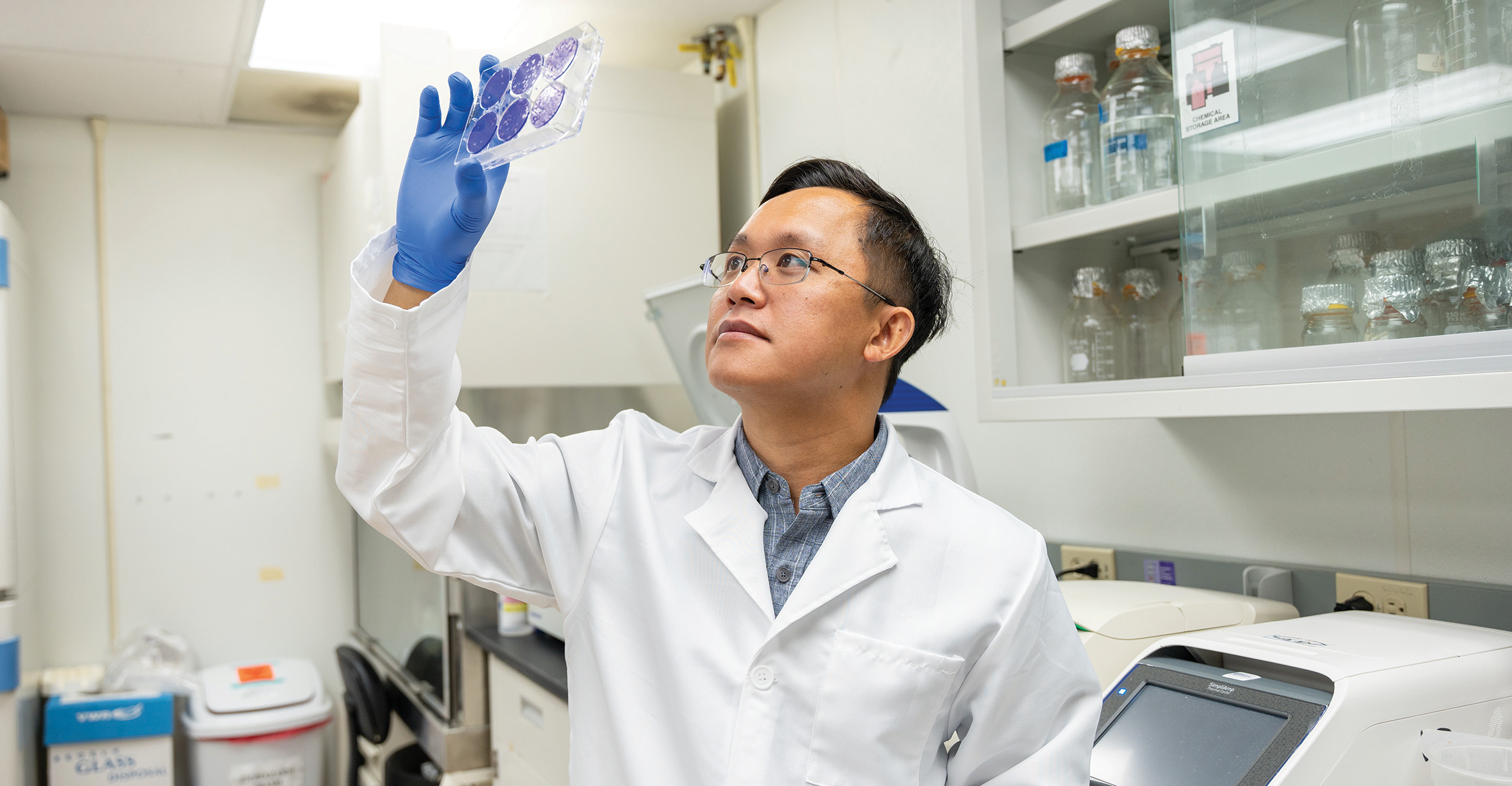
Vet Med research advances One Health initiative
Wednesday, August 31, 2022
Media Contact: Mack Burke | Associate Director of Media Relations | 405-744-5540 | editor@okstate.edu
Research done within the scope of veterinary medicine has a direct impact on humans. With this in mind, researchers at Oklahoma State University’s College of Veterinary Medicine (CVM) approach their work from a One Health perspective.
According to the Centers for Disease Control, One Health is an approach that recognizes the health of people is closely connected to the health of animals and our shared environment. While this is not an entirely new concept, it has become increasingly relevant in recent years with human-animal interactions on the rise.
One Health research topics in the CVM vary widely, from viruses that can transmit across species, such as coronaviruses, to cancer therapy.
Cross-Species Disease Transmission
The COVID-19 pandemic likely began with animal-to-human transmission.
You may be surprised to learn that it’s not an uncommon occurrence. Research of coronaviruses and how they affect the human population aids in the development of vaccines and antiviral drugs.
Dr. Xufang Deng is an assistant professor in the CVM’s physiological sciences department. His research focuses on studying coronaviruses, including SARS-CoV-2, as well as a variety of animal coronaviruses.
“My research is applicable to the development of vaccines, as well as antiviral drugs,” Deng said. “The molecule I am currently working with, we found, is a potent viral interferon antagonist, but when we mutate or inhibit the activity, the virus becomes super mild. We are trying to target this molecule for the development of effective antiviral drugs or vaccines.”
With the COVID-19 pandemic possibly on the verge of approaching endemic status, people may be wondering if another or different kind of animal-borne outbreak is possible.
“Yes, another human outbreak due to cross-species transmission is very likely,” Deng said. “The interaction between human environments and animals has increased, especially in developing countries, and those zoonotic coronaviruses could possibly jump to the human population.”
While another human outbreak is likely, Deng said the knowledge we’ve gained over the last three years has better prepared us for the future.
“We learned a lot during this pandemic,” he said. “As we look at the possibility of a future outbreak, the vaccines and antiviral drugs that have been developed will aid us in being much more prepared for a cross-species transmission in the future.”
Benefits of Biomedical Research
Respiratory syncytial virus, or RSV, is a contagious virus that causes infections of the respiratory tract.
Affecting mainly the elderly and young children, this common human virus can lead to serious problems, such as bronchiolitis or pneumonia, which can be life-threatening for these vulnerable populations. In the animal world, cattle are plagued by bovine RSV, which contributes to a complex cattle disease called shipping fever.
In 2019, out of 481 studies, there were 33 million RSV-associated acute lower respiratory infection episodes among children under 5. An estimated 101,400 deaths were attributed to the virus.
Dr. Tom Oomens, associate professor in the Department of Veterinary Pathobiology, is focused on vaccine development to treat RSV.
Over the past few years, his lab has developed unique vaccines with weakened bacteria that have the goal of making a safe and broadly effective vaccine that targets immunity in the respiratory tract where the virus enters the body. Some of the prototype vaccines were tested in mice and were shown to be safe and protective. For the next stage, Oomens will seek opportunities for more preclinical development, especially in more relevant models such as non-human primates.
The development of a vaccine to prevent RSV in humans is promising as researchers now also look at preventing bovine respiratory disease in cattle.
“Having developed promising vaccine approaches for humans, we are now beginning to see if we can translate these approaches into the veterinary world by looking at bovine RSV and testing it in calves,” Oomens said.
“This will be done in collaboration with two newly hired CVM investigators — Drs. Mayara Maggioli and Fernando Bauermann — who both have considerable expertise in large animal diseases. This expertise not only helps in designing a vaccine to protect cattle, but also gives us a better understanding of how bovine RSV affects calves and how human RSV affects children, thus presenting an excellent opportunity for One Health research.”
Breakthroughs in Research
Many current cancer treatments can be invasive, have toxic side effects and result in poor outcomes for patients. The CVM is at the forefront of cancer therapy research and is focused on developing methods to improve patient care.
Dr. Ashish Ranjan, Kerr Foundation Endowed Chair and professor in the physiological sciences department, leads the Nanomedicine and Targeted Therapy Laboratory at CVM.
Ranjan and his team are currently working to develop nanoparticles that enhance the immune system’s ability to detect and kill cancer cells, in combination with focused ultrasound.
“Treatment of malignant and surgically unresectable cancers requires a combination of radiotherapy and anticancer drugs,” Ranjan said. “However, such treatments can cause toxic side effects in normal tissues and often result in suboptimal therapeutic outcomes against advanced disease and poor survival of patients. As an alternative, we are focused on leveraging devicedirected nanotherapeutics to activate a patient’s own immune system against the error-prone cancerous cells.”
This type of immunotherapy approach can potentially provide new therapeutic options against radio- and chemo-resistant cancers and help patients with hard-to-treat cancers.
Ranjan also serves as the director of the OSU Institute for Translation and Emerging Research in Advanced Comparative Therapy. INTERACT’s key mission is to promote One Health research on campus by building new interdisciplinary collaborations.
“In addition to efforts from our lab. We are especially interested in leveraging INTERACT to improve bench to clinic research in various colleges on our campus,” Ranjan said. “We invite academic and industrial partners, as well as the public at large to partner in our cutting edge research and help us translate novel therapeutics to patients.”
Photos by: Taylor Bacon
Story by: Kaylie Wehr | STATE Magazine
